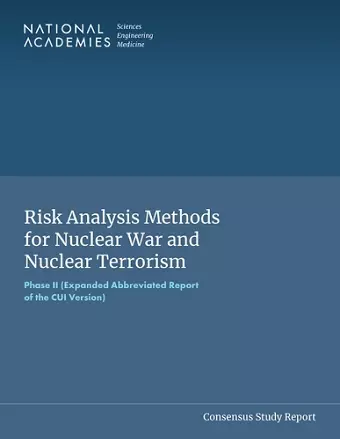Risk Analysis Methods for Nuclear War and Nuclear Terrorism
Phase II (Expanded Abbreviated Report of the CUI Version)
Division on Earth and Life Studies author Division on Engineering and Physical Sciences author Policy and Global Affairs author Nuclear and Radiation Studies Board author Committee on International Security and Arms Control author National Academies of Sciences, Engineering, and Medicine author Board on Mathematical Sciences and Analytics author Committee on Risk Analysis Methods for Nuclear War and Nuclear Terrorism author
Format:Paperback
Publisher:National Academies Press
Published:9th Jun '24
Currently unavailable, and unfortunately no date known when it will be back

The United States and the world face serious threats to nuclear stability and peace, now and in the coming decades. Within the nuclear arena, U.S. policy makers will need to make strategic decisions related to nuclear risks to assist with long-term planning as well as responding in real time to unanticipated events. The occurrence of unanticipated nuclear events is expected to increase as more countries develop, expand, or field nuclear energy capability; more countries consider development of nuclear weapon capability and new nuclear weapon states emerge; and nuclear weapon states expand their nuclear arsenals.
At the request of the Department of Defense, the National Academies of Sciences, Engineering, and Medicine established and managed the Committee on Risk Analysis Methods for Nuclear War and Nuclear Terrorism to explore U.S. government methods for assessing nuclear war and nuclear terrorism risks and how those assessments are used to develop strategy and policy. This publication is the unclassified Phase 2 version of the final classified report. Risk Analysis Methods for Nuclear War and Nuclear Terrorism: Phase II builds on an earlier Phase I unclassified report. This book expands upon the use of analytical methods to assess the risks of nuclear terrorism and nuclear war and the role such approaches may play in U.S. security strategy.
Table of Contents- Front Matter
- Summary
- 1 Introduction: Motivation and Context
- 2 Risk Analysis
- 3 Development of Risk-Informed Strategies
- 4 Conclusion
- References
- Appendixes
- Appendix A: Committee, Consultants, and Staff Biographical Information
- Appendix B: Request for Information
- Appendix C: List of Phase II Briefers <
ISBN: 9780309718257
Dimensions: unknown
Weight: unknown
60 pages